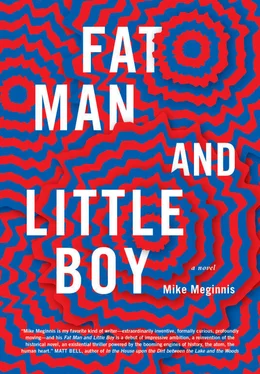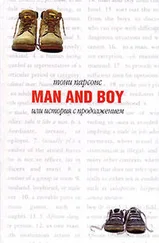“Why can’t you drink? Perhaps in America such outdated mores still stand, but in France, child, we all drink wine. If wine, then why not vodka? You see where I’m going with this.” He pours Little Boy a glass of the chocolate whiskey. “I think you’ll really like this.”
“I thought Japanese liked sake.”
“Drink up.” Masumi pushes the chocolate drink across the table. Little Boy lets it touch his tongue enough to burn. Knowing now the flavor and the scorch he drinks of it deeply, holding the glass as before he held the candle. He wipes his mouth with the back of his hand.
Masumi says, “You can tell me anything.”
Little Boy shakes his head.
“You don’t like to talk?”
“Why don’t you take off your hat?” says Little Boy. He gulps down more chocolate. “You’re being rude.”
“John, you’re right. I’m sorry.” He leaves the hat on. “Why don’t you like to talk?”
Little Boy shrugs.
“Are you afraid of what you might say?”
Little Boy shakes his head.
“What might you say, John?”
“Matthew.”
“What might you say, if you let yourself open your mouth? Would you scream? Would you weep? Would you confess?”
Little Boy finishes his drink and belches loudly. His eyes are bleary, swimming, he can feel them strain. He shakes his head. This looses the tears, makes them into several streams.
“You’re not supposed to drink it so quickly,” says Masumi.
A corner of blue shimmer fabric embroidered with needlepoint stars hangs out of the dresser’s top drawer. Little Boy stumbles across the room to touch it. So soft.
“Does the mold still follow you?” says Masumi. “Do the spores reach for your mouth? Do candles still spark when you touch them?”
Little Boy turns to glare at the Japanese gentleman. He says, “I’ve changed my mind. I want to clean your cabin.”
“You think you’ve calmed but if you were calm then you could speak to me. You think you’ve changed but you haven’t.” He opens his jacket. The holstered revolver is polished and it glints and shines. “I’ve got a gun.”
Little Boy pours himself another drink so later he can throw up. He says, “Who are you?”
“John, I will be your judge.”
“Then I won’t say any more. I’m going to take this glass. Leave my cleaning things outside your cabin for tomorrow. I’ll come back.”
“I’ll shoot you if you go without defending yourself.”
Little Boy tosses back half his second chocolate whiskey. “There’s nothing to say, and nothing to defend. What do you think I did? I didn’t do it. There’s my defense.”
Masumi draws his gun. He spins it on his finger like a fancy cowboy. Stops it aimed on Little Boy, grip tight, trigger half-squeezed. Lets it go and spins it more. His eyes climb and fall like a slot machine spinning as the butt of the gun replaces the nozzle replaces the ass replaces the muzzle.
“Goodnight,” says Little Boy. He leaves the door open behind him.
The ground shifts under his feet like an ocean, or the flesh of some heaving beast. He wants to see the tree. He needs to touch her.
He pauses behind an empty cabin to pee. Some dots his bare shins and short pants. It strikes him that most of the cabins are empty. In the night they are like headstones, faceless as a movie screen without the projector. He hurls his glass against one.
He will wake up on the grass beneath the tree, in her gentle shadow, the branches reaching for him, swaying above him, reaching across each other in a tangle, like many schools of bait fish.
He will miss a day of school.
Little Boy tells Fat Man how Mr. Wakahisa Masumi asked Matthew into his room. He tells his brother all about the liquor, though he does not mention the second glass or how he broke it. When Fat Man repeats the story to Rosie, he does not mention the gun, though he knows it would surely lead to Masumi’s ejection from the hotel. Fat Man can’t explain to Little Boy why he did not tell about the gun; there was guilt in being on the wrong end of a weapon. Rosie, outraged, informs Masumi that he will be required to maintain his quarters on his own from now on, and that he cannot be alone with Little Boy, or any other children for that matter, until he proves himself trustworthy. He is welcome to provide and receive continuing daily language instruction. Masumi does so with apparent good will and earnest desire to teach and to learn. He behaves himself very well. He is even charming. Rosie comes to see the episode as an issue of cultural differences—if the French, a relatively civilized society, are fool enough to give children wine, she can only imagine what might be considered normal in a place like Japan.
The image of Masumi’s table, legally Rosie’s, laid out with such a wide array of liquors, stays with her. While she sacrifices everything for world peace and rebuilding, a person at least a little crazy is living it up in her hotel with decadence and style. It makes her ill. Makes her jealous. Makes her reckless. The next week she buys too much food. She bends her budget and then the next week breaks it, taking several dozen pounds of salmon. She teaches Fat Man how best to prepare fish, using lemons and butter and other things the hotel can’t afford. The guests rave about the food. The newlyweds say they’ll stay an extra month. They must be rich.
It feels inevitable when she finds herself taking John and Matthew to the movies. Call it the logical endpoint of a long, slow decline. She fends off fits of guilt by rubbing her temples with her thumbs and forefingers for ten seconds. It has to be ten seconds; it has to be those fingers; it has to be her temples; it only works on guilt. Not stress, not anger, not shame, only guilt. She has rebuffed three such attacks since deciding to come to the cinema. Once when she asked John and Matthew to come along, leaving the hotel in care of no one but the guests, who were not informed of their absence. Once in the car on the way over—the car that she rented at some moderate expense. She settled, during the ride, on buying a car for the hotel so as to pick up guests and bring them home when they were done (for a surcharge exceeding the gas and the price of her time, of course: another margin). This made the guilt acute. She rubbed her temples. Now, in the back of the cinema, she feels it again. A pressure in her sinuses combined with a heat in her lungs that makes it hurt to breathe. She rubs her temples for ten seconds, meanwhile surveying the audience, mostly the backs of their heads. John sits on her left, and Matthew on her right. They gape at the blank screen, waiting for something to happen.
They’re dressed in their finest. A suit with a jacket a little too small on John, unbuttoned because he can’t button it. It used to fit him well; he’s growing. Matthew wears his best pants, his old jacket with the elbows worn thin. The little boy has not grown at all. Rosie’s father would have called Matthew a runt. She prefers the word “coltish.” Still, she could lift him with one arm.
The boys are still gape-mouthed like tired mules.
Rosie says, “Is this your first film?”
“Yes,” says Matthew.
“Yes,” says John.
“Really?” she says, looking at John with disbelief. “You seem the type to love a picture.”
“I guess I haven’t had much chance.”
“You’ll like it. It’s a lot of fun. Matthew, it’s okay if you get scared. You can cover your eyes like this.” Rosie veils hers with her hands, then parts her fingers to peek through. “It helps me sometimes during the battles. You know how I hate shooting.”
“I don’t like it either,” says Matthew. “Will there be a lot of shooting?”
“Well,” says Rosie, “it’s called The Ace .”
Читать дальше












